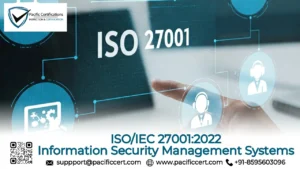ISO 14066:2023 Environmental Information — Competence Requirements for Teams Validating and Verifying Environmental Information
ISO 14066:2023 sets out the competence requirements for individuals and teams involved in the validation and verification of environmental information. It supports assurance that environmental declarations, emissions data, and sustainability claims are accurate, reliable, and credible.

This standard is crucial for organizations aiming to meet regulatory requirements, enhance corporate transparency, and build trust with stakeholders. The latest version strengthens the focus on sector-specific competence and technical rigor. For certification support, contact us at support@pacificcert.com.
Understanding ISO 14066 and its Relationship with Other Standards
ISO 14066 works alongside:
- ISO 14064 Series: Guidelines for quantification and reporting of greenhouse gas emissions and removals.
- ISO/IEC 17029: Conformity assessment — General principles and requirements for validation and verification bodies.
Together, they form the foundation for transparent and credible environmental reporting across industries, supporting initiatives like carbon neutrality, ESG (Environmental, Social, Governance) reporting, and sustainable development goals (SDGs).
Certification Process
- Initial Competence Gap Assessment:
- Review existing team qualifications and experience related to environmental information validation.
- Identify gaps in technical knowledge, sector expertise, and verification practices.
- Team Structuring and Competency Building:
- Assign roles such as team leader, technical expert, and independent reviewer according to ISO 14066 specifications.
- Implement targeted training programs and technical upskilling.
- Validation/Verification Process Planning:
- Develop detailed plans for project-specific validation or verification activities, including scope, methodology, and criteria.
- Implementation of Competency Framework:
- Ensure all team members demonstrate required sector-specific knowledge, validation skills, ethical behavior, and impartiality.
- Internal Evaluation and Mock Audits:
- Conduct internal competency assessments and simulated audits to verify readiness.
- Certification Audit:
- Pacific Certifications conducts an audit assessing the competence system, team selection processes, and validation/verification performance.
- Certification Issuance:
- ISO 14066:2023 certification granted upon successful demonstration of competence requirements. For process guidance, contact support@pacificcert.com.
Documents Required for Certification
- Competency Matrix and Role Definitions
- Training Records and Qualification Certificates
- Environmental Validation and Verification Procedures
- Project Plans and Methodology Documents
- Internal Evaluation Reports
- Code of Conduct and Impartiality Declarations
- Risk Assessment Reports related to Validation/Verification Activities
- Management Review Records
Need document templates? Contact support@pacificcert.com.
Eligibility Criteria
ISO 14066:2023 certification is applicable to:
- Environmental consultancies
- Validation and verification bodies
- Organizations providing assurance for environmental, carbon footprint, or sustainability claims
- Companies seeking accredited validation for carbon credit programs (e.g., CDM, VERRA)
For eligibility consultation, contact support@pacificcert.com.
Certification Fees
Fees depend on the size of the validation/verification team, project complexity, and organizational readiness. Request a detailed quotation by emailing support@pacificcert.com.
Certification Duration
Typical certification duration:
- Competency Gap Analysis and Team Building: 2-4 months
- Training and Documentation Preparation: 1-2 months
- Certification Audit and Issuance: 1-2 months
Overall, certification usually takes 4-8 months depending on team readiness and project volume. For a customized timeline, contact support@pacificcert.com.
Requirements of ISO 14066:2023 Certification
Organizations must demonstrate:
- Defined Roles and Responsibilities: Clear assignment of roles to ensure an effective and impartial validation/verification process.
- Sector-Specific Knowledge: Team members must have proven expertise in the sector(s) relevant to the environmental information being validated or verified.
- Technical Competence: Ability to apply appropriate methodologies, perform data analysis, and identify inaccuracies.
- Management of Impartiality: Systems must be in place to avoid conflicts of interest and ensure independence.
- Communication and Reporting Skills: Teams must clearly communicate findings and prepare transparent, understandable reports.
- Continual Improvement: Regularly updating competency frameworks, training programs, and process audits.
Need help building a compliance roadmap? Contact support@pacificcert.com
Benefits of ISO 14066:2023 Certification
- Builds trust with stakeholders through independently verified environmental information.
- Supports compliance with carbon reporting schemes and sustainability regulations.
- Demonstrates leadership in environmental responsibility and corporate transparency.
- Reduces the risk of data misreporting and associated penalties.
- Increases internal expertise and consistency across validation and verification projects.
- Strengthens ESG reporting credibility, aiding in sustainable investment attraction.
As global focus intensifies on climate change, sustainability, and transparent reporting, the demand for validated environmental data is surging. Governments, investors, and consumers increasingly demand assurance on carbon footprints, environmental impacts, and sustainability claims. ISO 14066:2023 is becoming a cornerstone requirement for organizations engaged in GHG validation, net-zero claims, and green finance projects.
Stay competitive and compliant by consulting support@pacificcert.com.
How Pacific Certifications Can Help?
Pacific Certifications provides full-service support for ISO 14066:2023 certification:
- Extensive experience in validation, verification, and sustainability assurance.
- From competency mapping to final audit.
- Recognized certifications to enhance international credibility.
- Ensures continual competence development and compliance maintenance.
Start your ISO 14066:2023 certification journey today by contacting support@pacificcert.com.
Frequently Asked Questions (FAQs)
Is ISO 14066 certification mandatory?
While not mandatory by law, it is increasingly required by carbon credit programs, ESG reporting frameworks, and regulatory authorities.
Can ISO 14066 be integrated with ISO 14065 and ISO/IEC 17029?
Yes, integration strengthens the validation and verification body’s management system and credibility.
What happens if a team member does not meet competence requirements? Corrective
Corrective actions, additional training, or team restructuring are needed before certification can be granted.
How often must competencies be reassessed?
Competencies must be reviewed at least annually or whenever significant changes in projects, roles, or standards occur.
Can ISO 14066 certification support participation in carbon markets?
Yes, certified competence in validation/verification is a key requirement for credibility in carbon trading and offset projects.
Ready to get ISO ISO 14066 certified?
Contact Pacific Certifications to begin your certification journey today!
Suggested Certifications –






